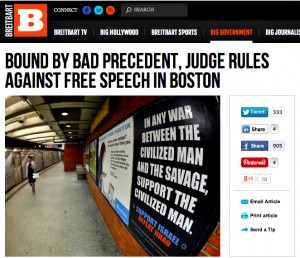 When ruling on our request for a preliminary injunction in our case challenging the MBTA’s censorship of our clients’ pro-Israel advertisement, the Massachusetts federal judge was bound by First Circuit precedent (n.b. the U.S. District Court for the district of Massachusetts is within the jurisdiction of the U.S. Court of Appeals for the First Circuit). In particular, the district court was bound by a fractured, 3-judge panel decision in Ridley v. Mass. Bay Transit. Auth. (MBTA), 390 F.3d 65 (1st Cir. 2004), in which the First Circuit upheld the constitutionality of the MBTA’s restriction on “demeaning” speech. According to the First Circuit, “[U]nder the MBTA’s current guidelines, all advertisers on all sides of all questions are allowed to positively promote their own perspective and even to criticize other positions so long as they do not use demeaning speech in their attacks. No advertiser can use demeaning speech: atheists cannot use disparaging language to describe the beliefs of Christians, nor can Christians use disparaging language to describe the beliefs of atheists. . . . . Some kinds of content (demeaning and disparaging remarks) are being disfavored, but no viewpoint is being preferred over another.” Id. at 91.
When ruling on our request for a preliminary injunction in our case challenging the MBTA’s censorship of our clients’ pro-Israel advertisement, the Massachusetts federal judge was bound by First Circuit precedent (n.b. the U.S. District Court for the district of Massachusetts is within the jurisdiction of the U.S. Court of Appeals for the First Circuit). In particular, the district court was bound by a fractured, 3-judge panel decision in Ridley v. Mass. Bay Transit. Auth. (MBTA), 390 F.3d 65 (1st Cir. 2004), in which the First Circuit upheld the constitutionality of the MBTA’s restriction on “demeaning” speech. According to the First Circuit, “[U]nder the MBTA’s current guidelines, all advertisers on all sides of all questions are allowed to positively promote their own perspective and even to criticize other positions so long as they do not use demeaning speech in their attacks. No advertiser can use demeaning speech: atheists cannot use disparaging language to describe the beliefs of Christians, nor can Christians use disparaging language to describe the beliefs of atheists. . . . . Some kinds of content (demeaning and disparaging remarks) are being disfavored, but no viewpoint is being preferred over another.” Id. at 91.
The dissent, rightfully so, took issue with the 2-judge majority opinion, stating, in relevant part, the following:
Religious belief is quintessentially a matter of viewpoint. The government cannot allow dissemination of one viewpoint that it finds inoffensive or bland, and prohibit the dissemination of another viewpoint that it finds offensive or “demeaning,” because the “point of all speech protection . . . is to shield just those choices of content that in someone’s eyes are misguided, or even hurtful.” Such distinctions are viewpoint based, not merely reasonable content restrictions.
By its very nature, a prohibition against ads that are “hostile” to an individual or a group of individuals is viewpoint based. The guideline would permit ads from Catholics, Pentecostals, Jehova’s Witnesses, Muslims and others stating their beliefs — their “viewpoints” — that their religions were ‘set up” by God. The MBTA, however, refuses to permit Ridley to state the opposite viewpoint: her belief that these religions were not “set up” by God, but are “false,” and that only her belief is correct. This is unquestionably viewpoint discrimination, as “the essence of viewpoint-based discrimination is the state’s decision to pick and choose among similarly situated speakers in order to advance or suppress a particular ideology or outlook.” Id. at 100 (internal citations omitted).
It is important to bear in mind that viewpoint discrimination is an egregious form of content discrimination that is prohibited in all forums. The principle that has emerged from U.S. Supreme Court cases is that the First Amendment forbids the government to regulate speech in ways that favor some viewpoints or ideas at the expense of others. Consequently, when the government targets not subject matter, but particular views taken by speakers on a subject, the violation of the First Amendment is all the more blatant. Here, the content of our clients’ message (and thus its subject matter: the Israeli/Palestinian conflict) is permissible in this forum, as evidenced by the fact that the MBTA had previously accepted the same message content that was submitted by a “speaker” that favors Palestinians and disfavors Israelis in this conflict. Consequently, it is not the (exceedingly controversial) subject matter that is being restricted, but our clients’ viewpoint on the subject. This is a classic form of viewpoint discrimination that is prohibited in all forums.
Indeed, in Cohen v. Cal., 403 U.S. 15 (1971), a famous Supreme Court case which upheld the right of a private citizen to strongly protest the draft by wearing message-bearing clothing (which included an expletive) in a courthouse to express his viewpoint on this political issue, the Court stated the following: “[W]e cannot indulge the facile assumption that one can forbid particular words without also running a substantial risk of suppressing ideas in the process. Indeed, governments might soon seize upon the censorship of particular words as a convenient guise for banning the expression of unpopular views.” Id. at 26 (emphasis added).
In our lawsuit against the MBTA, this is precisely what the speech-censoring, government bureaucrats have done. They have effectively banned the use of the word “savage” to describe those who engage in violent criminal acts (i.e., jihad) against innocent Israeli civilians. No matter how you cut it, this is viewpoint discrimination pure and simple . . . and a violation of the First Amendment.
